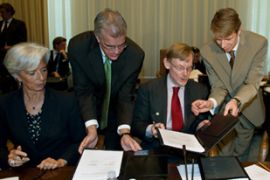IMF-World Bank meeting criticised
Ongoing talks on world economy seen as “wasted opportunity” for developing nations.

Delegates at the IMF-World Bank “spring annual meeting” that opened on Saturday endorsed stimulus measures to combat the economic crisis and clean up banks’ bad assets – effectively unvalued debt.
‘Reinforcing status quo’
Dominique Strauss-Kahn, the head of the IMF, said that the global economies’ ultimate recovery “is heavily reliant on” the clean-up of banks’ toxic assets.
It was agreed at the talks that the IMF’s loanable resources would be doubled.
In the first stage, $250bn would be available through a special facility to help “member countries with external financing needs”, followed by another $250bn, as agreed at the G20 summit on April 2.
Delegates signalled at the meeting that the IMF would also sell bonds to developing countries to help raise a portion of an expected $500bn IMF loan fund to help recession hit economies.
Many people are arguing that IMF contributions are being directed to reinforce the structural status quo, benefiting already rich nations.
More decision making power within the IMF is also being demanded by emerging markets such as China, Brazil, India and Russia before they respond to the extra financial burden they are being asked to provide the IMF.
‘Uncertain promise’
At present China, for instance, holds 3.78 per cent of voting rights in the IMF, but leading economies are asking them for $40bn – 8 per cent – of the new fund.
Talking to the New York Times, Eswar Prasad, an economics professor at Cornell University in the US and a former senior economist for the IMF, said that the demand for extra decision making for emerging markets signified that they were “drawing a line in the sand”.
“From the perspective of the key emerging countries, they are being asked to contribute a very substantial amount of resources in exchange for a very uncertain promise of reform,” Prasad said.
Earlier this week, the IMF predicted the global economy would shrink by 1.3 per cent this year.
The IMF forecast marked a dramatic downgrade of previous estimates and set the tone for the meetings of the top steering committees of the 185-member IMF and World Bank.